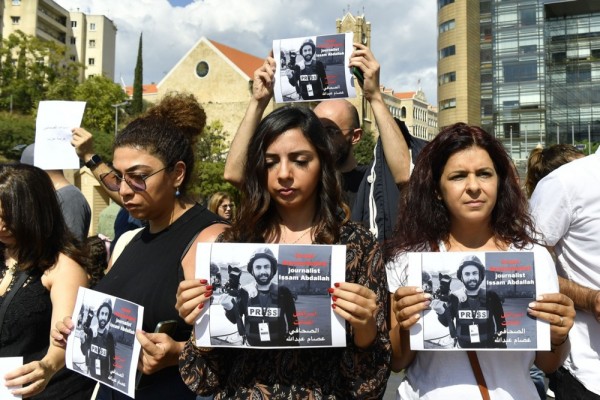Those who planted the car bomb that killed former Lebanese Prime Minister Rafik Hariri in 2005 did not stop there. Among those targeted were journalists. In June 2005, history professor and An-Nahar columnist Samir Kassir was killed in a car bomb outside his house. Three months later, May Chidiac, a presenter for LBC television, survived a bomb in her car but lost an arm and a leg in the explosion. An-Nahar’s chief editor and political leader Gebran Tueni was killed on 12 December that year.
Hariri and so many others were killed, some analysts believe, because he and his pro-Western supporters demanded an end to the Syrian presence in their country. The UN Special Tribunal for Lebanon (STL) has a mandate to investigate the murder of Hariri, but also attacks starting with the attempted murder of parliamentarian Marwan Hamadeh in October 2004, followed by other assassinations and attempts through the end of 2005 and beyond, if they are believed to be linked to Hariri’s death and are agreed upon by the Lebanese government, the United Nations and the Security Council, according to the STL website.
“The Special Tribunal for Lebanon should continue its investigations not only into the assassination of former Prime Minister Rafik Hariri, but also into the murder and attempted murder of journalists in 2005,” said IPI Press Freedom Manager Anthony Mills.
In late June, the Tribunal issued arrest warrants for four alleged members of the Shiite militant group Hezbollah, who are suspected of allegedly killing former Lebanese Prime Minister Rafik Hariri, marking the beginning of a judicial process that observers hope will bring closure to a country that has been waiting for answers since Hariri’s death. Members of Interpol are now also on the alert for the four accused, lest they attempt to cross international borders.
For May Chidiac, who survived an assassination attempt in 2005 but lost an arm and a leg, it would also mean progress in her own quest for justice. Hopefully, it would also allow journalists in the country to feel safer. Because, as is almost always the case and the intention when journalists are killed, the deaths of Samir Kassir and Gebran Tueni, and the attempt on Chidiac’s life, had a ripple effect on the Lebanese media.
“After the attack on my life and the assassinations of Samir Kassir and Gebran Tueni, the Lebanese media felt as though they had been the targets of these attacks through their mouthpieces,” Chidiac told IPI in an emailed interview. She said that media began “setting aside the truth” in their reports, and claims that there were financial and political deals made that resulted in the dismissal of some journalists from their jobs. She said that “media outlets wanted to avoid malicious attacks and feared the worst from the ones who have the power to silence them.”
Samir Kassir, a columnist at An-Nahar as well as a historian and vocal opponent of Syrian influence in Lebanon, was the first journalist to be killed that year.
Wissam Tarif, a Syrian activist, told IPI that the murder of his friend had not come as a shock. “I wasn’t surprised, I knew that Samir was a target in the sense that what he was writing and what he was saying… he was a visionary,” Tarif said. “Samir wasn’t afraid to criticize, and he wasn’t afraid to name things by their names.”
Tarif said Kassir’s death was not the result of a radical agenda. “In many ways politically I always saw Samir as a moderate – I never saw him as someone who was radical in any way,” Tarif said, adding that “Kassir was pro- freedom to the maximum and pro-democracy to the maximum [which] in that era was by itself dangerous.”
“It was obvious at the time that every distinguished and free journalist in Lebanon was a target for assassination,” Marwan Hamadeh said. The pro-Western parliamentarian survived an October 2004 attempt on his life, but lost his nephew Tueni the next year. He is now one of the leading parliamentarians calling for Lebanese cooperation with the Tribunal.
“It was not the first time An-Nahar was targeted,” Hamadeh said, recounting that the paper had been subject to other explosions and financial pressures in the past.
“Gebran being at the head at one of the most renowned newspapers and independent newspapers in the Middle East, we immediately identified the purpose of the killing, which was to destroy one of the main press establishments in the area,” Hamadeh said.
Investigations into the attacks did take place in Lebanon and, in the case of Kassir, in France, but these were inconclusive.
“[A]fter my rehabilitation in France in 2006, the investigations began almost immediately,” Chidiac said. “Many have tried to cloak the truth, divert the blame from others, and display false evidence and allegations. Consequently, the results have been delayed too many times.”
She said she was waiting impatiently for the final outcome. “It has taken a long time for the team of investigators to reach the verdict, let us hope that justice will truly be served.”
During an IPI visit to Beirut in October 2009, journalists from a number of print and broadcast news houses said that while Lebanese media represent a diverse set of political views, self-censorship on certain issues relating to national security is common.
“In this regard, strengthening the independence of Lebanon’s judiciary is of paramount importance, as is the willingness of the authorities to pursue cases to their conclusion,” IPI said in a 2009 report. “A culture of accountability for crimes committed is more likely […] to reverse a worrying increase in self-censorship which editors and reporters told IPI has resulted from the killings and attempted killings.”
The current Lebanese government is dominated by members of the former opposition who are seen to take a dim view of the STL and its findings. Nonetheless, Prime Minister Najib Mikati said the government will support the UN Tribunal – after having been accused by former Prime Minister Saad Hariri, son of the murdered Rafik, of being a “Hezbollah representative.”
But the Special Tribunal and its conclusions have been met with disdain by Hezbollah leader Hassan Nasrallah, who denies any Hezbollah involvement, and says that Lebanon will never arrest these men. “No Lebanese government will be able to carry out any arrests whether in 30 days, 60 to days, 1 year, 2 years, 30 years or even 300 years,” he said, according to a New York Times translation. He says the Tribunal is an American-Israeli plot.
Members of the March 14 Alliance that pushed for Syrian withdrawal after Hariri’s death insist that Lebanon must cooperate.
“No stability will prevail in Lebanon if Justice does not prevail. It is high time in the Arab world, especially in a country that is the oasis of democracy, that people do not exterminate others just by killing them in order to obtain political hegemony,” MP Hamadeh told IPI. “So putting an end to the crimes that have been committed in Lebanon for so many decades will start now, and we hope it will welcome a new era of justice, stability and democracy.”
Chidiac said that the indictments are the “only way for journalists and all those who believe in freedom of speech, to feel free in expressing their viewpoints and defend the truth in a country where democracy is supposed to be prevailing.”
She said that many people still do not understand that, in its mandate to investigate the assassinations, the Tribunal is “not prosecuting specific political parties, groups, or people, [but] the ones who use barbarism as a means of diplomacy.”
“The truth about one crime marks the beginning of freedom in a country where tyranny and oppression has long reigned as well as shed innocent and patriotic blood,” Chidiac said.
Wissam Tarif went further – the Tribunal must prosecute those who masterminded the attacks, too. “At the end of the day, lots of people in Lebanon know who killed Samir Kassir,” said Tarif. “The role is to put the flesh on the skeleton, not only who killed them, but who planned it, who ordered it[…]. That is the expectation on the STL.”
“Personally I wouldn’t feel any justice has been achieved if the STL ends up naming a few people who pulled the trigger. That is not who killed Samir Kassir,” Tarif said. “Those who killed Samir are much higher in rank and they should be held accountable.”


